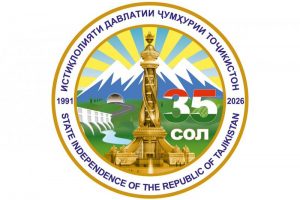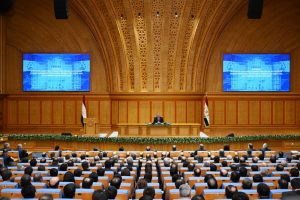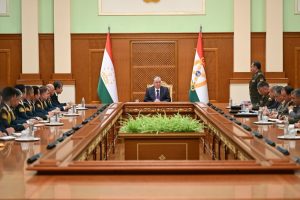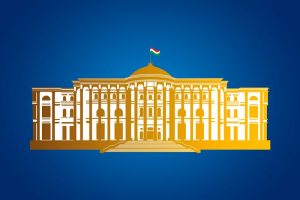Leader of the Nation Emomali Rahmon Opens Pillai Tojik OJSC in Dushanbe
Read also
DUSHANBE, 20.04.2024 (NIAT Khovar) – On April 20, the Founder of Peace and National Unity — Leader of the Nation, President of the Republic of Tajikistan, Honorable Emomali Rahmon, and the Chairman of the Majlisi milli Majlisi Oli of the Republic of Tajikistan, Mayor of the city of Dushanbe, Honorable Rustam Emomali, opened in Navbahor neighborhood of Sino district a textile enterprise, «Pillai tojik» Open Joint-Stock Company in honor of «Capital Day».
In the factory, cocoons are processed to the final level, and high-quality silk, atlas and adras are produced.
Currently, 300 people are provided with permanent jobs in one shift at the factory and its nursery.
During the presentation of a sample of silkworm cultivation in traditional conditions, it was informed that the goal of silk plantation restoration in all cities and districts of the country is the development of the industry.
The great Leader of the Nation, Honorable Emomali Rahmon, assessed the initiative of Dushanbe Executive body of state power in cooperation with representatives of the private sector in the direction of building and restoring industrial enterprises, creating opportunities for increasing the production of import substitution products and creating new jobs as important and timely.
«Pillai tojik» OJSC consists of a cocoon drying workshop, a fiber processing workshop, a packing workshop, a laboratory, a printing, weaving, cleaning, wool dressing, fabric dry cleaning workshops, atlas and adras workshop, and handmade carpets weaving workshop.
The company’s devices and equipment are imported from the People’s Republic of China and European countries, which contributes to the production of high-quality products that meet the requirements of world markets.
The President of the Republic of Tajikistan, Honorable Emomali Rahmon, tasked the relevant officials to make full use of natural and technological conditions, expand the production possibilities of the enterprise and increase the number of employees.
After harvesting, the cocoon is dried in the factory, sorted and turned into thread in the silk technological line.
The annual capacity of silk production is more than 40 tons and the production of silk thread is more than 60 tons. Prepared silk is turned into fabric in a textile factory.
Exemplary implementation of the instructions of the Head of State within the scope of achieving the fourth strategic goal — rapid industrialization of the country made it possible to increase the production of import-substituting products through the construction and rehabilitation of industrial facilities, and to involve more and more residents of the country in permanent work in the industry.
The printing device, the technology of which was imported from Italy, is the first in the country and is aimed at producing beautiful and attractive products by introducing patterns. The new technology makes it possible to enter a pattern into the computer’s memory according to the customer’s request and to pattern the fabric according to the order.
At the atlas and adras workshop, artisans prepare from silk and cotton threads different types of atlas and adras using 26 weaving machines. Along with the use of modern technology, the production of atlas and adras is carried out by hand in order to continue the good tradition of our ancestors in the direction of the production of this type of fabric, to ensure the variety of production and to offer quality products.
At the same time, young people are involved in training, they learn the subtleties of the art and then they get a job in this place.
Also, based on experience, hand weaving of carpets using silk has also been introduced. High-quality long fiber silk is used for the production of fabric, and the rest of it is used for weaving beautiful carpets that meet market requirements.
At this place, the Head of state was presented with atlas, adras, girbishin, satin, bekasab and other types of fabrics produced at the factory.
It was emphasized that in the future, women will be able to wear this kind of high-quality products of domestic production with pride from the past civilization of the nation.
The adoption of «Silkworm cultivation and traditional production of silk for weaving» as an intangible heritage of humanity proves the history and civilization of the Tajik nation and the meritorious achievements of the Tajik nation in the production of this type of product.
Today, the goal of the state and the Government of the Republic of Tajikistan is aimed at reviving the good traditions of our ancestors, developing crafts and creating decent living conditions for the country’s residents.
In the same place, there was also organized an exhibition of folk crafts, national dishes and various types of bread products, such as kulcha, chapati and tahmol. The continuous attention of the Head of State, the provision of benefits and reliefs to the artists and the high sense of self-awareness of the people contributed to the revival and development of handicrafts in Tajikistan. It is the result of this that tourists can buy different types of handicrafts, which, along with the improvement of the economic opportunities of artisans, at the same time contributes to the presentation of the history and spirituality of the nation.
The great Leader of the Nation, Honorable Emomali Rahmon, highly appreciated the results of the activities of artisans and entrepreneurs in the direction of increasing the production of atlas and adras, creating various types of handicrafts and developing handicrafts, and considered it necessary to use as many privileges as possible, established by the Government of the country, and to increase the achievements.
Also, the products produced by light industry enterprises of Dushanbe city were presented. The implementation of the instructions and orders of the Head of State by the Mayor of the city of Dushanbe, Rustam Emomali, made it possible to provide opportunities for the double development of the industry with the construction and restoration of industrial enterprises.
In order to create the basis for the development of silkworm cultivation, 2 million mulberry seedlings have been planted in the past 2 years to expand the area in farms. In the future, 1 million mulberry seedlings will be planted every year.
Also, a modern nursery for intensive fruit-bearing seedlings has been built next to «Pillai tojik» OJSC on the area of 30 hectares of land.
Here, the Head of State got acquainted with the plan to build a garden, technological possibilities, modern horticulture practices and samples of fruits to be produced in the future.
These tree saplings were imported from Europe, and after adaptation to the climatic conditions of Tajikistan, it is intended for the creation of intensive modern gardens.
The President of the Republic of Tajikistan, Honorable Leader of the Nation Emomali Rahmon drew the attention of horticulturists to strengthening the relationship between science and production, full use of natural opportunities, taking into account climate change and increasing the production of quality fruit for export.
Native apple, pear and plum seedlings in the amount of 300,000 were imported from Italy. Cultivation of this plant is carried out in accordance with technological requirements, next year 1 million 800 thousand seeds will be taken from them, and in the following years up to 2 million seeds.
3,600 seedlings are planted in one hectare of the intensive garden, and its irrigation is carried out by two methods, drip and rain. Also, by this means, seedlings are protected from cold and insects by spraying special solutions.
The fruit yield from these orchards reaches 65 tons per season. Cultivation is based on the advanced experience of reputable companies and exchange of experience is carried out in coordination with production representatives in Tajikistan.
Honorable Leader of the Nation, Emomali Rahmon, instructed the leaders of relevant ministries and agencies, regions and the Academy of Agricultural Sciences of Tajikistan to start construction of intensive gardens, taking into account the conditions.
It was also ordered to create conditions for conducting practical experiments of students and scientists in the nursery of «Pillai tojik» OJSC, mastering the nuances and as much as possible the best modern horticulture practices, taking into account the current climatic conditions.
Mulberries and local pistachios are cultivated in this large area.
In general, during the last 4 years, 4 million local pistachio saplings were planted by the company in the waste lands of the cities and districts of the country. Now 1,200,000 local pistachio seedlings have been prepared and are being planted.
In general, the implementation of the instructions of the Leader of the Nation in Dushanbe and the launch of «Pillai tojik» OJSC on the Capital Day will facilitate to the creation of new jobs, processing of local raw materials to the final level, development of the industry, revival of the good tradition of silk weaving of our ancestors and increase in the production of import substitution products.











 President Emomali Rahmon Approves Emblem for the 35th Anniversary of Tajikistan’s State Independence
President Emomali Rahmon Approves Emblem for the 35th Anniversary of Tajikistan’s State Independence President Emomali Rahmon Holds Working Meeting with Heads of Security and Law Enforcement Agencies
President Emomali Rahmon Holds Working Meeting with Heads of Security and Law Enforcement Agencies Expanded meeting of the Government of the Republic of Tajikistan
Expanded meeting of the Government of the Republic of Tajikistan President Emomali Rahmon makes personnel appointments
President Emomali Rahmon makes personnel appointments President Emomali Rahmon makes personnel changes in the structures of the Supreme Court, the Higher Economic Court, the Ministry of Foreign Affairs
President Emomali Rahmon makes personnel changes in the structures of the Supreme Court, the Higher Economic Court, the Ministry of Foreign Affairs President Emomali Rahmon makes personnel appointments in the structures of the Ministry of Internal Affairs
President Emomali Rahmon makes personnel appointments in the structures of the Ministry of Internal Affairs President Emomali Rahmon makes personnel appointments
President Emomali Rahmon makes personnel appointments Commentary to orders of the President of the Republic of Tajikistan on the republican competitions «Tajikistan – My Dear Homeland», «Science – Dawn of Enlightenment» and «Book – Dawn of Knowledge» in 2026
Commentary to orders of the President of the Republic of Tajikistan on the republican competitions «Tajikistan – My Dear Homeland», «Science – Dawn of Enlightenment» and «Book – Dawn of Knowledge» in 2026 Emomali Rahmon, Vladimir Putin discuss strengthening strategic partnership between two countries
Emomali Rahmon, Vladimir Putin discuss strengthening strategic partnership between two countries New Year Address of the President of Tajikistan to the Nation
New Year Address of the President of Tajikistan to the Nation Meeting of the Government of the Republic of Tajikistan
Meeting of the Government of the Republic of Tajikistan














